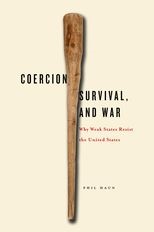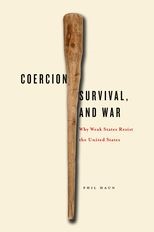Coercion, Survival, and War: Why Weak States Resist the United States
Coercion, Survival, and War: Why Weak States Resist the United States
Cite
Abstract
This book considers why with its tremendous military advantage the United States so often fails to coerce much weaker states. The answer frequently resides in the large asymmetry in power which provides the United States a high probability of victory in a brute force war. The resultant high expected outcome from war introduces an incentive to leverage coercive demands upon a weak adversary, concession to which threaten the survival of the state, its regime, or its regime leadership. Perceiving its survival at stake an opponent will resist, so long as it has the means to do so. Theoretically, to avoid signaling costs, a powerful challenger should only choose coercive strategies likely to succeed. In practice, however, as in Iraq in 1991 and 2003, U.S. leaders may first seek United Nations Security Council resolutions to lower the diplomatic and political costs for brute force war. Coercion may also fail when interests are so limited that the United States cannot continue to make its threats credible as in 1986 following the El Dorado air raid against Libya. In other cases, as in Bosnia and Kosovo, coercion eventually succeeded, but not before coercive diplomacy failed as the United States placed the prestige of NATO at stake over non-vital interests.
-
Front Matter
-
1
Introduction
-
2
A Theory of Asymmetric Interstate Coercion
-
3
Survival and Coercion Failure
-
4
The United States versus Iraq: The Gulf and Iraq Wars
-
5
The United States versus Serbia: Bosnia and Kosovo
-
6
The United States versus Libya: El Dorado Canyon, Pan Am Flight 103, and Weapons of Mass Destruction
-
7
Conclusion
-
End Matter
Sign in
Personal account
- Sign in with email/username & password
- Get email alerts
- Save searches
- Purchase content
- Activate your purchase/trial code
Institutional access
-
Sign in through your institution
- Sign in with a library card Sign in with username/password Recommend to your librarian
Institutional account management
Sign in as administratorPurchase
Our books are available by subscription or purchase to libraries and institutions.
Purchasing information| Month: | Total Views: |
|---|---|
| October 2022 | 3 |
| January 2023 | 2 |
| March 2023 | 6 |
| May 2023 | 1 |
| August 2023 | 2 |
| August 2023 | 2 |
| August 2023 | 2 |
| August 2023 | 2 |
| August 2023 | 2 |
| August 2023 | 2 |
| August 2023 | 2 |
| October 2023 | 1 |
| January 2024 | 1 |
| February 2024 | 3 |
| March 2024 | 5 |




Get help with access
Institutional access
Access to content on Oxford Academic is often provided through institutional subscriptions and purchases. If you are a member of an institution with an active account, you may be able to access content in one of the following ways:
IP based access
Typically, access is provided across an institutional network to a range of IP addresses. This authentication occurs automatically, and it is not possible to sign out of an IP authenticated account.
Sign in through your institution
Choose this option to get remote access when outside your institution. Shibboleth/Open Athens technology is used to provide single sign-on between your institution’s website and Oxford Academic.
If your institution is not listed or you cannot sign in to your institution’s website, please contact your librarian or administrator.
Sign in with a library card
Enter your library card number to sign in. If you cannot sign in, please contact your librarian.
Society Members
Society member access to a journal is achieved in one of the following ways:
Sign in through society site
Many societies offer single sign-on between the society website and Oxford Academic. If you see ‘Sign in through society site’ in the sign in pane within a journal:
If you do not have a society account or have forgotten your username or password, please contact your society.
Sign in using a personal account
Some societies use Oxford Academic personal accounts to provide access to their members. See below.
Personal account
A personal account can be used to get email alerts, save searches, purchase content, and activate subscriptions.
Some societies use Oxford Academic personal accounts to provide access to their members.
Viewing your signed in accounts
Click the account icon in the top right to:
Signed in but can't access content
Oxford Academic is home to a wide variety of products. The institutional subscription may not cover the content that you are trying to access. If you believe you should have access to that content, please contact your librarian.
Institutional account management
For librarians and administrators, your personal account also provides access to institutional account management. Here you will find options to view and activate subscriptions, manage institutional settings and access options, access usage statistics, and more.